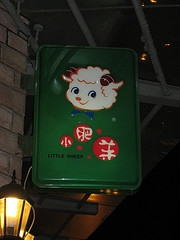 Tom Orlick, who does the Heard on the Street pieces for China at the Wall Street Journal, did a short but excellent rundown of some of the commercial challenges Chinese hot-pot chain Little Sheep (LSGLF.PK) faces as global fast-food monster YUM (owner of KFC, Pizza Hut, and Taco Bell) sets out to acquire the company. There are other bogeymen in the basement of this deal, however, and the largest of those is the Chinese government.
Tom Orlick, who does the Heard on the Street pieces for China at the Wall Street Journal, did a short but excellent rundown of some of the commercial challenges Chinese hot-pot chain Little Sheep (LSGLF.PK) faces as global fast-food monster YUM (owner of KFC, Pizza Hut, and Taco Bell) sets out to acquire the company. There are other bogeymen in the basement of this deal, however, and the largest of those is the Chinese government.
The government has regularly demonstrated (but not often communicated) its policy on foreign companies buying local firms, a topic I last covered in the wake of Coca-Cola’s failure to acquire Chinese juice giant Huiyuan. Put simply, while the government is comfortable allowing foreigners to acquire struggling or failing Chinese companies, they object to healthy, growing local companies winding up in foreign portfolios.
Regulators especially object to budding local brands like Little Sheep falling into non-Chinese hands. Chinese regulators may see Little Sheep c. 2011 as McDonalds c. 1960, and would be in no hurry to see that brand captured so young and turned into an American global franchise operation.
Worse, regulators get very squeamish when a local brand is being acquired by a foreign company already dominant in the sectors. The PRC restaurant industry is incredibly fragmented, but there is arguably no company with a wider collective brand presence in mainland eateries than YUM.
There are enough parallels between the YUM/Little Sheep deal and the Coke/Huiyuan deal, then, to suggest that regulatory review is going to be a major hurdle, if not a deal killer.
YUM has one hope for success, and that is an astute and persuasive communications full-court press to build local support for the purchase among both regulators and the public at large. That campaign needs to start yesterday.
If, however, YUM skimps on